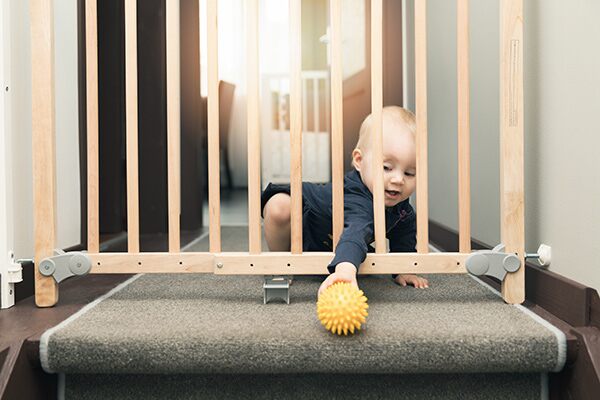Make sure your children are safe, as well as your apartment. Certain safety precautions in your apartment or town home will need to be addressed when you have young children because you may not have done so earlier. Everything changes when your child learns how to walk, from kitchen cupboards to plants to huge pieces of furniture like a couch and a stairwell.
Fortunately, childproofing equipment don’t cost a lot of money. If you have a baby, here are some quick and easy methods to make your rental baby-safe without losing your security deposit.
Plan ahead of time if at all feasible.
In the event that your plans for a new rental fall through before your baby is born or before your little one begins crawling, there are a few elements to keep in mind for their security and well being.
Is there anything that a baby gate can’t keep off, such as a stairwell, balcony, porch, or ledge? All windows should lock tightly to prevent accidental tumbling. Are there no elevators in the building where the unit is located? Take a look about you. Which types of people live next to you—mostly families or young adults who may be up later?
See things from your child’s point of view.
Things you don’t think about can quickly pique the interest of an inquisitive, newly mobile youngster. You should think about relocating fragile objects such as plants, picture frames, and other home décor out of reach of youngsters in your apartment.
Make sure the floor is free of tripping hazards such as cables, pet bowls, and other tiny objects that you wouldn’t want your youngster to eat. To avoid any mishaps, make sure all floor-level electrical plugs are covered.
Stairs might be your toughest obstacle to overcome.
If there are stairs in, or going up to, your apartment, you’ll have to devise a plan to keep your children safe. Make sure the handrails on your interior and outdoor stairways are robust and in excellent condition for the safety of people of all ages. Avoid accidents by using non-slip materials in areas where the ground is slick from winter weather or your stairs are made of a slippery hardwood.
Renters should be aware that pressure-mounted baby gates are not a reliable solution to the problem of youngsters falling down the stairwell and being hurt. Before you put up a baby gate at the top of your stairway, talk to your landlord about it and agree to fix any holes in the wall that result from your installation (or pay to have them repaired). In order to avoid being held liable for an accident that occurs on their property, most landlords will listen to your arguments.
Secure the cupboards and cabinets by locking them.
Pots and pans, medical supplies, cleaning supplies, and other potentially hazardous things can be found in cabinets and cupboards throughout your property, making them a danger to youngsters. To avoid causing damage to your cabinets, choose for childproof locks that don’t require any special installation.
Adhesive, magnets, or cabinet knobs are just a few of the installation methods available these days. Rearrange your storage such that all potentially harmful goods for youngsters are kept in higher-level, out-of-reach places if you don’t have locks on your cabinets and drawers.
Rethink furniture selections to make them more kid-friendly
Furniture is probably one of the things that you as a tenant have the greatest influence over unless you rent a furnished apartment. Replace any furniture that is unstable, sharp, or fragile with something that is more family-friendly.
If you can’t afford to replace the furniture, you can always buy safety guards to protect your children from the sharp edges while they’re still small. Check with your landlord beforehand before installing any hardware if you want to provide extra protection by attaching specific parts to the wall.
Priority is given to your children, not you.
Having a child as a renter may rapidly become a source of stress. Renters may easily avoid injuries and mishaps with small children if they plan ahead and communicate openly with their landlord.
Even proposing to a family with a toddler that an apartment on a higher level would be better suited for someone else might be considered discriminatory under federal housing laws.
Early on in the process, have a discussion with your landlord regarding kid safety. They’ll want to collaborate with you to avoid any mishaps for which they’ll be held responsible.

